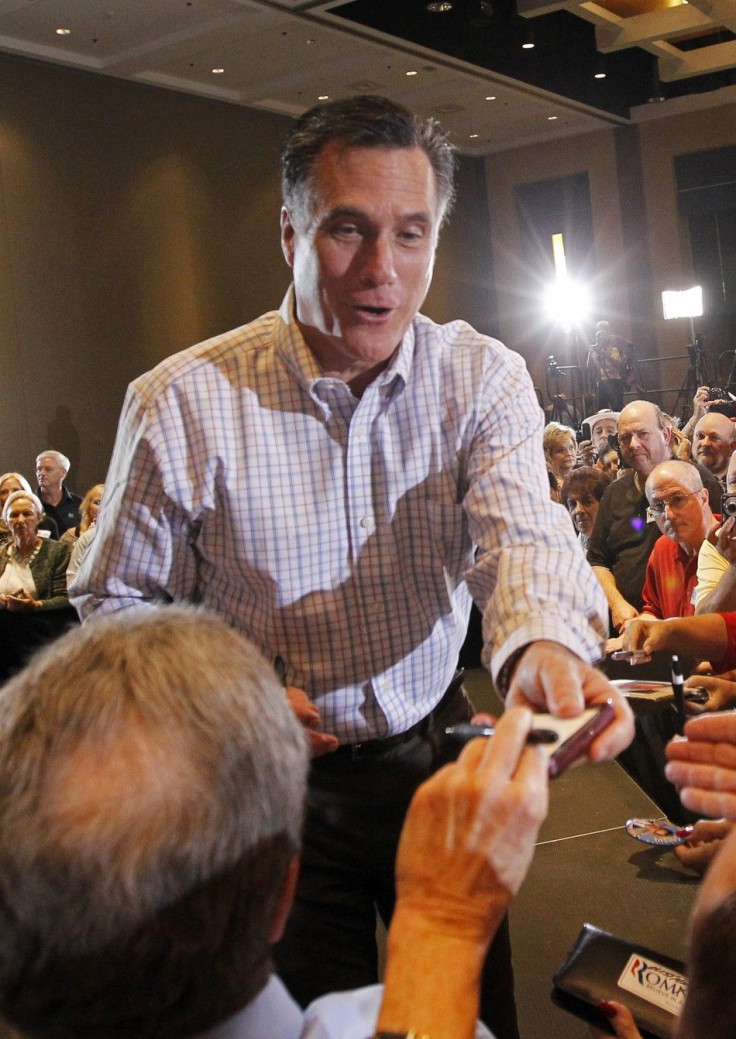Why Mitt Romney is the Anti-Obama
ANALYSIS

For all the hand-wringing about Mitt Romney being insufficiently conservative, the last few days have demonstrated how a Romney candidacy would give voters a clear alternative to the progressive vision articulated by President Barack Obama.
Conventional wisdom dictates that the 2012 presidential campaign will hinge on the economy. But that concerns more than the unemployment rate or the budget deficit.
At stake is a broader question about what role, if any, the government should play in enacting policies that ensure access to economic opportunity, safeguard a certain standard of living and encourage an equitable distribution of wealth. It was a question posed by the Occupy Wall Street movement, and it will undoubtedly play a prominent role in contrasting Obama with an opponent that seems increasingly likely to be Romney.
Two Themes for 2012 Campaign
In a rousing Kansas speech that has been widely interpreted as a template for his reelection campaign, Obama spoke forcefully of how many Americans have faced diminishing prosperity as the most affluent saw their wealth increase. He referenced the ongoing debate over how restore balance, restore fairness, and invoked Theodore Roosevelt in noting that the free market has never been a free license to take whatever you can from whomever you can. He dismissed the idea that simply lowering taxes and rolling back regulations would invigorate the economy, a philosophy that he branded 'you're on your own' economics.
In the wake of a resounding New Hampshire primary victory that has solidified Romney's standing as the Republican frontrunner, the former Massachusetts governor has vigorously defended the viewpoint that Obama denounced. In his New Hampshire victory speech, Romney accused Obama of wanting to put free enterprise on trial and embracing the bitter politics of envy, echoing his criticism in October that the fledgling Occupy Wall Street movement constituted class warfare.
Throughout the campaign, Romney has touted his business experience as a key qualification. In a preview of the general election, some of his opponents have begun attacking his time at the helm of the investment firm Bain Capital. Former House Speaker Newt Gingrich and Texas Gove. Rick Perry have both sought to portray the company, which restructured other ventures to make them more profitable, as a job-destroying instrument of ruthless, predatory capitalism.
Those attacks have drawn condemnations from throughout the Republican Party. The influential conservative commentator Sean Hannity equated Perry's description of Romney practicing vulture capitalism with Occupy Wall Street; even former Pennsylvania Sen. Rick Santorum, Romney's rival for the nomination, felt compelled to defend Romney.
Romney Defends Work at Bain Capital
Romney has also defended his work at Bain, noting that in the private sector that there are some businesses that are growing and thriving...And there are some businesses that have to be cut back in order to survive. But more telling than Romney's past as a titan of capitalism was a recent interview in which NBC anchor Matt Lauer asked Romney about the politics of envy line.
Lauer asked Romney about his use of the word envy and about whether the issue at stake was jealousy, or fairness.
Did you suggest that anyone who questions the policies and practices of Wall Street and financial institutions, anyone who has questions about the distribution of wealth and power in this country, is envious? Lauer asked.
Romney replied by again accusing Obama of fomenting class warfare and affirming that it's about envy. When Lauer pressed him, asking whether there can be fair questions about the distribution of wealth without it being seen as envy, Romney said that such matters should be confined to quiet rooms and discussions about tax policy and the like.
The exchange coincided with the Pew Research Center releasing a survey finding a surge in the percentage of Americans who see strong or very strong conflicts between the rich and the poor. The finding parallels a debate about growing income inequality in the United States. America has fallen behind much of the developed world in reducing income discrepancies as the gulf between rich and poor has risen to its highest level since the Great Depression.
Obama's top economic adviser outlined the administration's view in a Thursday speech to the liberal-leaning Center for American Progress, stating that rising inequality has been bad for the U.S. economy. Alan B. Krueger, the chairman of the White House's Council of Economic Advisers, outlined how middle class wages have stagnated and economic mobility has shrunk as the wealthiest accrued a mindboggling share of the nation's wealth.
Conversely, Romney's fiscal plan makes no mention of inequality, focusing instead on fostering GDP growth with measures that include cutting the corporate tax rate, rolling back regulations and making permanent the tax cuts for the wealthiest Americans that President George W. Bush enacted and Obama has vowed to eliminate. It promises to repeal Obama's healthcare overhaul, most important for its impact on economic growth and the labor market, and to curtail the effects of the Dodd-Frank financial reform bill.
The unifying thread to these proposals is the assertion that Washington has become an impediment to economic growth. While that has become a standard Republican economic doctrine, Romney's unflagging belief in the restorative power of the free market, coupled with his contention that any discussion of economic inequity stems from envy of the rich or attempts to incite conflict, clearly outlines the rhetorical framework that will guide the 2012 presidential race.
© Copyright IBTimes 2025. All rights reserved.





















